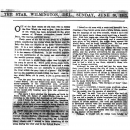Main menu
- ‘Abdu’l-Bahá’s Journey
- World Peace
- Stopping Racism in America
- Empowerment of Women
- More Principles...
- Prayer for America
The Star Out of the East
OUT of the East comes an old man who is telling the New World the way to live. Into the stress of life which has been developed in the great centers of Western civilization comes ‘Abdu’l-Bahá, who teaches universal peace.
Forty years of his life he has spent in a Turkish prison, considering the truths which his father and the Báb — the John the Baptist of his faith — uttered before him. It is a new religion and yet an old philosophy. It is the doctrine of the brotherhood of man. In a sense, it is the essence of Socialism. In its broadest aspects, it is the confirmation of the hopes and aspirations of the world’s greatest minds.
An old man is ‘Abdu’l-Bahá — older than by right of his years he should be. Years spent within stone walls, when his daily food was a handful of dates and a stone pannikin of water, are not conducive to youthfulness. He lived within the gray light of a prison. Yet always had he the sunshine of truth within his heart. And today ‘Abdu’l-Bahá, old in years, is yet a young man in spirit.
For the past few weeks he has been studying the United States. He has found here much that he admires — progress in the commercial arts, advanced thought in methods in government, an inventive genius that leads the world — but the old man sighs. Not yet is our moral side keeping pace with our intellectual advancement.
For years I have studied the precepts set forth by Bahá’u’lláh, the father of ‘Abdu’l-Bahá, who is now carrying to the world the doctrines of his ancestor.
And I found in him the truths which are knocking at every man’s door each day of his life, that the prophets of old have always sought to bring home to the people. Let me tell you something about him.
A FEW days ago I went to see him. Soon he will start on a visit to many of the principal cities of the United States — Buffalo, Cincinnati, Chicago, Denver, Seattle, San Francisco, Salt Lake City, St. Louis and many others — and I wished to learn something of his plans during his brief stay in the United States.
I found an old man with a worn and beautiful face, wearing a long brown gown and a white turban, speaking the language of my own country, which I have not heard for many years, whose every word was a benediction. Just four years ago, when the Young Turks came into the control of the government and a constitution was given to the country, the prison doors opened for ‘Abdu’l-Bahá, and he found himself free. He had gone into the prison a boy and he left it an old man.
He had not complained, and indeed for some years it had been made easy for him by the affection of his jailers and the gradual perception by the government of the fact that a man who teaches the common brotherhood of all humanity may not be personally violent; but none the less he rejoiced in his freedom. With the passing of the years his followers had grown rapidly and he had a wish to see them, especially those who lived in foreign countries.
Although he was old and had not for more than forty years gone beyond the city of Acre, in Syria, he was attracted by the thought of seeing the big world. The Bahá’í believe above all things in education and in broadening the mind by contact with all nations and races, so it was eminently consistent for ‘Abdu’l-Bahá to go first to London and then to come to America to see the many disciples in this country.
I asked ‘Abdu’l-Bahá, “The Servant of God,” what the country needed.
To speak truthfully, I feared some platitude which would bring me no nearer a solution of the problem. Yet his speech was the essence of simplicity.
“My son,” he said, “you are a people who lead all the world, yet you are not yet near the end you seek. You are not a people to whom happiness has yet come. You estimate material things at a value disproportionate to things spiritual, and until the spiritual side is developed equally with the material the proper balance will not be struck. But it will not be long,” he added, “before America will realize this, and then she will become the greatest nation that has ever existed in the history of the world.”
Perhaps it would not be amiss here briefly to…









